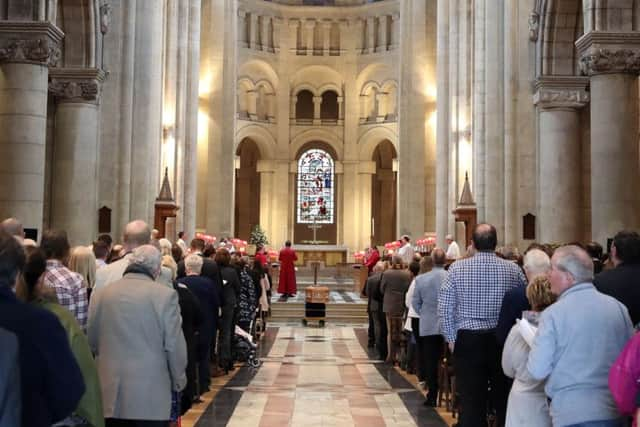Alex Kane: Calling for change in our politics is the easy part


For hundreds of people it was the first funeral of its kind they had attended. They were still hurting. They still hadn’t come to terms with Lyra McKee’s death. They knew they wanted change, even if they weren’t entirely sure in what form that change should manifest itself.
So it was no particular surprise that they responded to Father Martin Magill’s roasting of the politicians with a standing ovation. He summed up their anger with the failings of the political process. I could understand their reaction.
Advertisement
Hide AdAdvertisement
Hide AdBut what I didn’t understand is why the politicians joined in the ovation. Why would you stand up and applaud criticism of yourself? It wasn’t as if they had missed, or didn’t understand what he had just said about them. And it wasn’t as if they actually agreed with his criticism. They stood up because they didn’t know what else to do in the circumstances.


Had they been serious they would have issued a joint statement a few hours after the service; acknowledging the criticisms of both the congregation and Father Magill and committing themselves to an immediate restoration of government. But they didn’t do that: and they had no intention of ever doing that.
I talked to some young people who were at the funeral (although I wasn’t there myself). But while it was clear that they agreed on a ‘something different, something better’ approach to politics here, it was also clear that there was no unanimity among them.
That’s not surprising. Just because you agree that Lyra’s death was appalling it doesn’t mean that you will agree on the political process, the constitutional question or the immediate priorities. Just because you agree that there should be a government in place to take decisions on health etc (let’s face it, cancer doesn’t care if you’re a unionist or republican), it doesn’t mean you agree on issues like an Irish language act, reform of the petition of concern, or addressing legacy problems. Just because you agree that the DUP and SF should be working together, it doesn’t mean you’ll agree which of them shoulders the greater responsibility for the ongoing impasse.
Advertisement
Hide AdAdvertisement
Hide AdSo all those, particularly the post-1998 generation, who say that change is a priority in the aftermath of Lyra’s death, need to face the brutal, uncomfortable reality, that they may be no more successful in delivering that change than the 65% plus of present voters (2017 general election) who are consolidating around the DUP and SF. Let’s not forget, either, that the UUP and SDLP – paler versions of the DUP and SF – accounted for 22%. In other words, 87% voted along traditional lines last time, with every likelihood of doing much the same thing later this week.
Constructing change from that electoral background, with the same parties taking part in the new round of talks on May 7, will be enormously difficult: not least because the DUP (rightly in my opinion) still blames SF for crashing the Assembly on January 9, 2017, by way of Martin McGuinness’s resignation letter; while SF (with the Rowan/Mallie paper trail to confirm their claim) still blames the DUP for crashing a potential deal in February 2018.
If the DUP and SF consolidate/grow their vote in Thursday’s election, that will set a particular tone for the new talks. If the UUP/SDLP/Alliance make ground at the expense of the big two that will set another tone. If SF eclipses the DUP (easier to do in a local rather than general election) that sets another tone. A significant drop or rise in overall turnout also has an impact on tone. If the total unionist vote slipped a few points below the non-unionist vote that, too, would have an impact. What happens at the EU election on May 23 (and none of the five parties, all of whom have a runner, will be giving any hostages to fortune between May 7 and 23) could well shift the tone again. As could the possibility of another general election if Mrs May and the Conservatives take a hammering on May 2 (248 English local councils) and/or May 23. As I’ve been saying a lot over the last two years, all of this is uncharted political/electoral territory.
When it comes to the viability of the talks process, the British and Irish governments will be looking for evidence of what might be described as the ‘Lyra effect’. That evidence would have to come in the form of both the DUP and SF taking a significant hit, with a clear shift to the so-called middle-ground and the similarly so-called moderate wings of unionism and nationalism. At this point I don’t see any evidence of that.
Advertisement
Hide AdAdvertisement
Hide AdBoth the DUP and SF are playing the border poll card, albeit from different angles, and the expectation has to be that it will work for them on Thursday. Naomi Long, in a tweet to me last week, said, ‘The one thing they (councillors) have no role in is the future of the Union.’ But for most voters the constitutional question is always in play, which is why 409 of the 462 councillors elected in 2014 are from parties with an unambiguous stance on the Union. London and Dublin will be waiting to see if Alliance, in particular, can reverse that trend.
Unless I’m completely wrong (which is, of course, possible) the non-politicians who rose for the standing ovation at Lyra’s funeral will be hugely disappointed by Thursday’s results. Personally, I’d be happy to be wrong: we need something to shift the political/electoral dynamics. But if I’m right then they need to decide what to do next. I hope they won’t drift away. I hope they won’t opt out. I was never a fan of Barack Obama, but on one thing he was right: be the change you want to see.